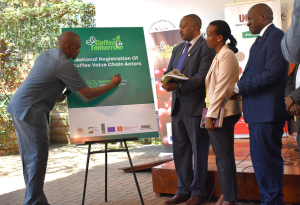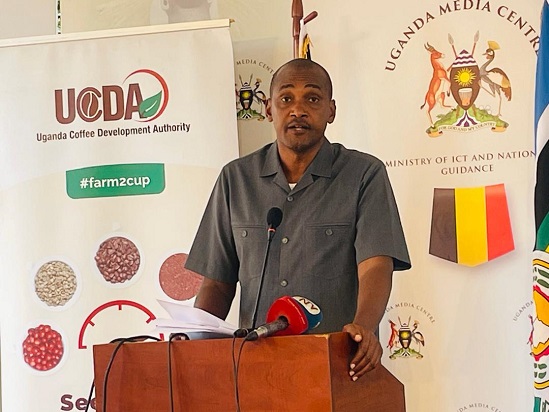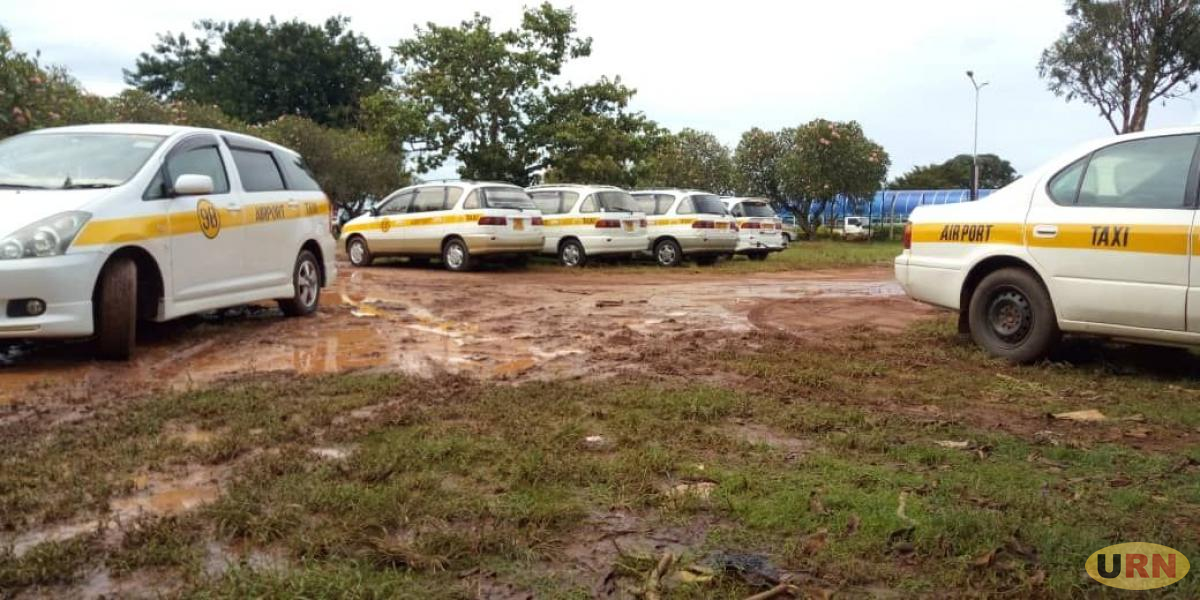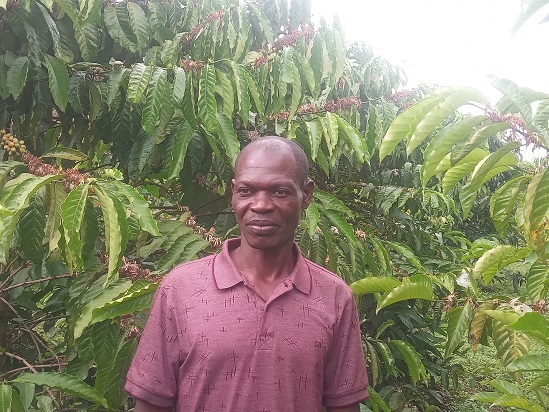Frank K. Tumwebaze, the Minister of Agriculture, Animal Industry and Fisheries , addressing the press at Uganda Media Centre
Government has officially launched the registration of coffee farmers and other value chain actors as Uganda races to meet the European Union Deforestation Regulation (EUDR) requirements that are aimed at ensuring that supply chains remain free from products contributing to deforestation and forest degradation.
Speaking at the launch of the registration exercise at Uganda Media Centre on Tuesday, October 1, 2024, Frank K. Tumwebaze, the Minister of Agriculture, Animal Industry and Fisheries (MAAIF), called on all leaders (political, cultural and religious), coffee value chain actors, and district local government leaders to support this registration exercise.
“It is crucial for ensuring continued access to international markets and effective mapping of coffee farms. I emphasize that this is a win for all,” Tumwebaze said, adding: “Further appeal goes to all those who intend to invest in the agriculture sector particularly farming to ensure that moving forward, all agriculture expansion adopts sustainable production practices that preserve the environment.”

On 5th December 2022, the European Parliament approved the European Union Deforestation Regulation (EUDR) aimed at ensuring that supply chains remain free from products contributing to deforestation and forest degradation.
The regulation targets seven commodities and their derived products, namely cattle, cocoa, coffee, oil palm, soya, wood, and rubber whether imported or produced within the EU. These commodities will be prohibited from entering the EU market if they are produced on land cleared of forest for agricultural purposes after 30th December 2020.
The EU regulations came into effect on 29th June 2023 and will come into application on 30th December 2024. The regulation is part of the broader efforts intended to combat climate change, biodiversity loss, and environmental degradation.
Why EU Market is key
Tumwebaze says that EU represents a primary export market for Ugandan coffee, with over 60% exported to the EU market including Italy, Germany, Spain, Belgium, Portugal, Russia, Switzerland, Sweden and the Netherlands.
He says since the deadline for compliance to EUDR is 30th December 2024, MAAIF, UCDA, private sector players in the coffee value chain and development partners have prioritized registration of coffee value chain actors so as to enable traceability of our coffee and prove that our source farms have not contributed to deforestation. It is also to prove that our coffee farming is environmentally friendly and sustainable.
EU Market requirements on exports
Tumwebaze says different markets have different requirements for coffee imports. For example, imports into China require registration with the General Administration of Customs of the People’s Republic of China (GACC), Sudan being a main consumer in Africa requires ISO Certification and submission of annual test results for both physical and biochemical coffee parameters to Sudanese Standards and Metrology Organisation (SSMO) and the European Union requires compliance with the EUDR.
“For each of these export market segments, Uganda’s approach has been to ensure adherence to the set standards. It is for this reason that we continue to mobilise and offer advisory to the various actors in the value chain (farmers, traders, exporters, etc.) to act right and comply,” the Minister said.
The EUDR requires that all products exported or imported to the EU market are; deforestation-free; the production of coffee was done on land that was not subject to deforestation or forest degradation after 30th December 2020; produced in accordance with the relevant legislation of Uganda; accompanied by a due diligence statement; containing geolocation data adhering to traceability standards that enable buyers to trace each batch of coffee back to its designated land plot.
“Fortunately, our newly enacted National Coffee Act, 2021 had already provided for establishment of a national register for coffee value chain actors..Registration of coffee value chain actors is an essential precursor to the creation of a National Traceability System. Such measures are vital for supporting our coffee farmers, enhancing sustainability, improving market access, and ensuring compliance with both local legislation and international regulations,” Tumwebaze said.
He emphasized that this registration process is being conducted free of charge by the Uganda Coffee Development Authority (UCDA) and partners and it is not to serve any other purpose apart from enabling the development of the value chain and access to global markets.
“When farmers are profiled/registered, extension outreaches and information dissemination become easy,” he said.
Registration process
He explained that a dedicated Technical Working Group has been established to oversee the effective implementation of EUDR regulations. This group comprises representatives from UCDA, MDAs and private sector.
“A Geospatial Monitoring and Evaluation (M&E) System and Farmer Registration Application has been developed. This innovative system will capture geolocation data for all production plots where coffee or related products are cultivated,” the Minister further explained.
He noted that a team of enumerators will carry out the registration process on behalf of UCDA and industry players.
“All coffee value chain actors including farmers, traders, processors etc. will be registered. The enumerators will record essential details of the value chain actors such as their name, farm name and location, type of coffee grown/produced, among others,” he said, adding: “In addition, enumerators will map farms/gardens by recording their GPS coordinates. UCDA will store and manage the data collected in partnership with NITA(U) and will ensure compliance with the Data Protection Act during the collection, storage and management.”
The Minister further said that in addition to the efforts towards retaining the existing markets, the Government of Uganda will continue efforts to promote agricultural products such as coffee to emerging markets including China, Middle East and Maghreb among others.
Appreciation
He thanked the Government of Uganda for providing resources for registration of value chain actors.
“ I also thank Development Partners (aBi Development and UNDP) for the funding support and Civil Society organisations for mobilizing farmers,” he said.
Key facts
Uganda is the 7th largest coffee producer in the world and the second largest producer in Africa. Coffee is one of Uganda’s main foreign exchange earners contributing 11-22% of commodity exports in the last 11 years i.e. averaging 14% over the period.
Coffee is grown on an estimated 353,907 hectares of land by about 1.8 million smallholder farmers and 90% of these smallholder farmers own gardens ranging between 0.5 and 2.5 hectares in size.
More than 9 million people in Uganda are estimated to derive their livelihood from coffee-related activities along the value chain.
Notably, global demand has been growing at a rate of approximately 2% annually over the last 20 years.
Uganda’s coffee exports for twelve months (Financial year 2023/24) totaled 6.13 million bags worth US$ 1.14 billion compared to 5.76 million bags worth US$ 846.02 million in the previous year (Financial year 2022/23). This represents an increase of 6.33% and 35.29% in quantity and value respectively.







That is a very good move by the government. But my worry is farmers who have done nothing in these enterprises are always selected to benefit in such programs whereby at the end of the program no sustainability is impacted. Take nusaf 1, 2 and 3. Take NAADS, no impact is seen.
Am capable of identifying different types of coffee according to their out put products and more so the hazards that affects coffee
I have been registering coffee farmers in kanungu with Paula,. farmers are happy for current price
Good innovation
Am found in kalungu district, kyamulibwa sub county, kabaale Palish, village Namasavu
Phone number 0774735974
Am trained on how to identity types of coffee (kRLines)
Am trained on how to control pests and diseases that attack coffee tree ie Coffee wilt disease
Am sure that I have confidence to register all the farmers